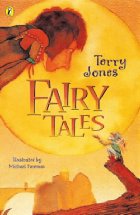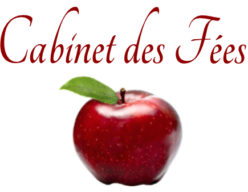Fairy Tales
Terry Jones, 1981.
Reviewed by Erzebet YellowBoy
 Terry Jones’ Fairy Tales leapt out at me from the shelf of a used book shop in one of those happy moments when two of your beloved worlds collide. The stories were written for Sally Jones in the summer of 1978, according to the dedication, and even though this book was first published in 1981, it wouldn’t do to have a site devoted to fairy tales that didn’t mention this delightful and somewhat subversive collection. And it is no wonder that we find the stories inside sometimes unsettling, for Terry Jones was a member of Monty Python who were responsible for some of the finest and silliest moments film has ever seen. The stories themselves are gorgeously illustrated in ink and watercolor by Michael Foreman, a fascinating artist whose style complements them absolutely.
Terry Jones’ Fairy Tales leapt out at me from the shelf of a used book shop in one of those happy moments when two of your beloved worlds collide. The stories were written for Sally Jones in the summer of 1978, according to the dedication, and even though this book was first published in 1981, it wouldn’t do to have a site devoted to fairy tales that didn’t mention this delightful and somewhat subversive collection. And it is no wonder that we find the stories inside sometimes unsettling, for Terry Jones was a member of Monty Python who were responsible for some of the finest and silliest moments film has ever seen. The stories themselves are gorgeously illustrated in ink and watercolor by Michael Foreman, a fascinating artist whose style complements them absolutely.
Jones’ stories read like fables; they are short and sweet though lacking the heavy-handed morality often associated with that story type. That is not to say these tales aren’t without their lessons, but whatever message Jones might want to relay is carefully secluded within his rampant imagination. Of the thirty tales contained in this collection, my favorite is “The Fly-By-Night”. Complete with flying cats, talking stones and a moon that could easy have been the inspiration for the Moon in The Mighty Boosh‘s night sky, this story contains all of the elements of the traditional fairy presented in Jones’ unique style. All of the stories are nonsensical, lyrical and eminently readable, and in each of them we can find glimpses of our own childhoods.
Even without the dedication, it is obvious that these tales were written for a child. Jones is following in that same tradition of Oscar Wilde, who believed that it was every father’s duty to write fairy tales for his children. That is what I like best about this collection. As I read it, I may as well have been that younger me, laughing at the antics of Prince Betram the Bad, or Miss Lollipop’s Lion, or The Pokey Little Puppy. I was restored to that sense of “original participation” by stories that almost implore one to be bold, to seek out adventure and to cherish life’s moments of delight. It isn’t the characters that appeal so much as it is the sense that one is young again, with the whole world still wide open for exploration.
